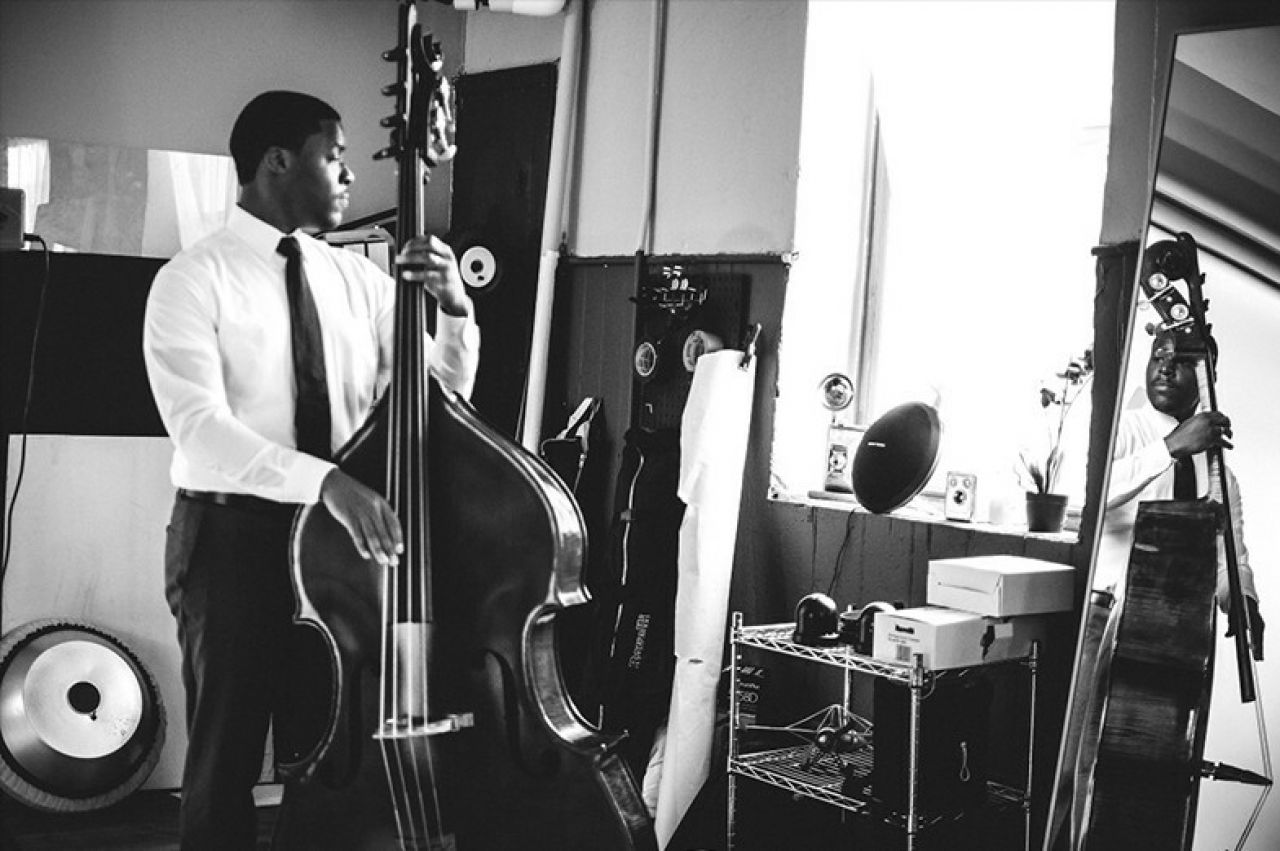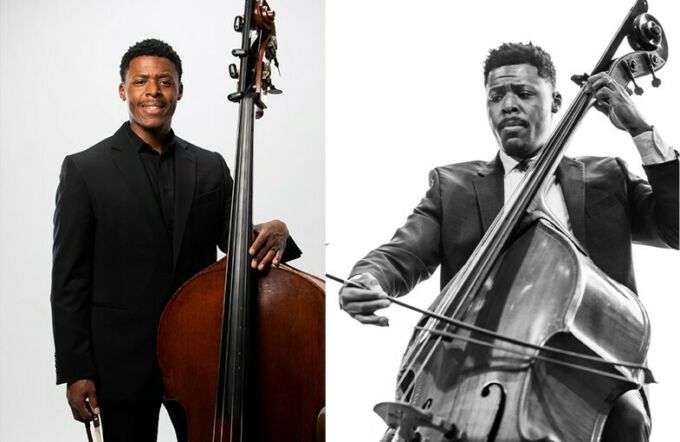April 19, 2023
Penn State alum and bassist Ian Saunders talks Beyonce, Project STEP and what “Amazing Grace” means to him

After earning both his bachelor's and master's degrees in double bass performance at Penn State, Ian Saunders' career in music blossomed. The 2012 graduate has performed with major ensembles, taught in youth programs and at the collegiate level, and served as assistant dean for artistic and social change at The Longy School of Music. Saunders is also the host of the podcast “Pretty Sharp” and was recently named artistic director at Project STEP (String Training Education Program) in Boston.
Despite the violin being Saunders' first instrument, he has flourished in the bass world. He took the time in April to speak with the College of Arts and Architecture about a life in music and his Penn State experience.
A&A: How old were you when you started playing bass?
IS: I was a freshman in college when I switched to the bass. I played the violin from fifth grade to twelfth grade. I switched in college, partly because with the violin, unless you come out of the womb playing, it's really hard to get a scholarship. And I needed a scholarship in order to go to college; there was just not an option there.
A&A: When was the moment you fell in love with playing bass?
IS: When I got to Penn State, Robert Nairn [former professor in the School of Music] happened to be the president of the International Society of Bassists. Real nerdy club, but it was great. It's a big thing in the bass world and every two years, they have a convention where players from around the world gather and they have like a week's worth of concerts dedicated to the bass and pedagogy and all that stuff.
At any rate, he was the president, so he actually brought the convention to Penn State in 2009, I believe. And so that was the first time that I saw the best bass players in the world. What are the chances, right? The best bass players in the world coming to State College and playing, and the best teachers.
That week was just mind blowing. So I got a chance to experience that and be at the college that hosted it, which meant that I got a chance to kind of meet a lot of these players behind the scenes. That's when I realized this was a good change. It's funny how things find you. I felt like my personality just worked well with the bass. It's funny how it kind of just worked. At this point, I can't picture myself being anything but a bass player.
A&A: Who is your musical idol?
IS: I would say musical idol as far as someone that I'm very grateful for is Rob Nairn. In some ways, I've even modeled my career a little bit after his. But anybody who really knows me well knows that I love Beyoncé. I don't think I could ever be like Beyoncé on the bass. But I would be lying to you if I said that I have not played through most of the songs on “Lemonade” on bass just to live somewhat through that experience.
A&A: Who are your favorite bass players?
IS: I'll break it up into three categories because that's the thing about playing bass, everyone needs a bass player across all genres. As far as favorite orchestral bass player, [it] is a guy named Joseph Conyers in The Philadelphia Orchestra. As far as a solo bass player who is just great, that's Edgar Meyer. He's awesome. And then [my favorite] electric bass player is Victor Wooten. You know, if I could play like that on electric, that'd be great.
A&A: What is your favorite piece to play?
IS: “Amazing Grace.” The story behind that is when I was growing up, it takes a lot to like a young string player because you don't sound good on strings in the beginning. It sounds pretty bad. But, you know, to my family's credit, they would just always let me put on these little mini concerts for them. My grandma was one of my biggest fans. And we always had this agreement where, after whatever I played, if I played Bach or Mozart or whatever, I always had to play her favorite song, which was “Amazing Grace.” I played for my grandmother all the time.
When she passed, I actually played that at her homegoing ceremony. All the years when I played it, I would always make all of these different variations and differences based off of, you know, how I heard it in church. And when she passed, I stopped making any changes to it. I just played it the way I played it for her the last time ever. So, every time I play that song, and I don't play it often, but every time I play it in public it's just this kind of connection that I have with her. It just means a lot every time I play that particular piece. It is one of the pieces I've become known for, but it's really just due to her.
A&A: What is Project STEP?
IS: STEP is an acronym for String Training Education Program. It's a program for violinists, violists, cellists and bassists, and it's specifically designed for communities that are typically underrepresented in classical music. So, African American, LatinX, Southeast Asian, in the Boston area.
It was founded 40 years ago with this idea of having orchestras look more like the community that they serve. So, Project STEP is actually a small sort of student body, but it's very comprehensive. We have students from K through 12, and they actually stay the entire time. We pay for all their instruments, we pay for all their lessons, pay for all their orchestra summer programs, just all their music string education from kindergarten to 12th grade.
We have a 100 percent graduation rate from the program. Most of them go on to become music majors and we've had some great alumni come from the program. We've had several that were featured on “From the Top,” which is a major broadcast for young classical music players. One of our alumni just won the $50,000 grand prize in the Sphinx solo competition. So, there's a very, very high level, but you also have students who have gone on to start their own programs. One of our alums started a program similar to STEP in Arizona, kind of as his way to give back.
It's very near and dear to me because it's one of those things where if I lived in Boston, I definitely would have been part of Project STEP. But it's wonderful. And as the artistic director, I basically oversee the seasons and put the season together. They do actually have a concert season, which is crazy for that age group.
We have about 60 kids, so it's big enough where it's a sizable program, but still small enough where it's intimate. Maybe the student doesn't want to take 20th-century theory, which I don't blame them, you know. Maybe they want to explore jazz theory. There's that flexibility to kind of do that because we treat all of them like mini artists, as opposed to, like, pay your dues as a student. They get a chance to perform, and that's the nice thing about Project STEP.
A&A: What is your favorite part of the job?
IS: The kids. I mean, they're so good. They keep me very honest. I thought the days that I had to practice for hours on end were over, but in order to keep up with them, I do have to still play. I do still play a lot, which is nice. I have a nice balance there. But they keep me on my toes for sure. So, it's just working with these really wonderful students. Just being a part of them. Building greatness in their lives through music is really an honor and a privilege.
A&A: As a musician, a teacher and a podcast host, what is the message you try to spread through these different platforms?
IS: I truly believe, without it being hyperbolic, that music can be an agent for change. But only if it does two things.
One, music is the interface for all of our lived experiences, right? We all live, laugh and love and experience loss. I think music has a unique way of kind of being this interface for life. And I think as long as we allow all of those experiences to come through in music, it will definitely provide that change.
And then two, everyone having that same sort of access to pursuing that [a career in music] to their heart's content. And I think if music can do those two things, it really lends itself to providing social change. Through my teaching, administration, performing and podcasting and speaking, I think all of those speak to that one idea of, music is a force for change when it's available to everyone, but when it also speaks for everyone.
A&A: How did Penn State help prepare you for where you are now in your career?
IS: From a technical aspect, as I said before, Rob Nairn was great at just giving me so much attention to just help me technically, you know, I honestly can't say enough about him. Had I not met Rob, I don't think I would be playing today. But then the other thing about Penn State that I always appreciate is that Penn State is definitely a place where the more you put into it, the more you get out of it. Penn State has a lot of resources that you can tap into. That's been the great thing.
From an artistic standpoint, I love the fact that Penn State always supported me as an artist. What I mean by that is, they always encouraged me to find my own artistic voice. That is something that's really kind of hard to teach, that's such an intrinsic thing. But that also made me stand out when it came time to join the very competitive field of music. I had a very distinct artistic voice for myself that they also helped me to articulate by giving me the technical skill. As much credit as I give to Rob Nairn, honestly, the whole body of faculty while I was there, you know, they were great. They were just all really supportive.
